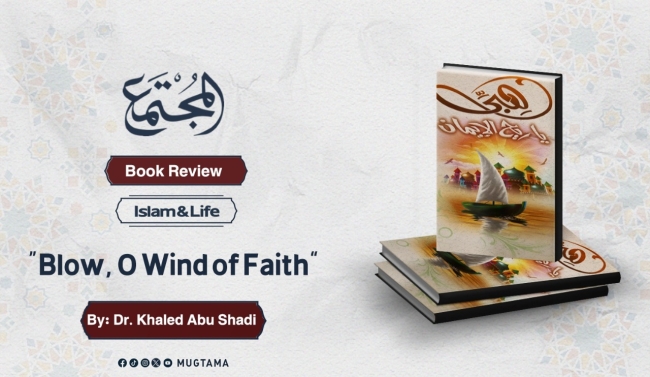Book Review of “Blow, O Wind of Faith” by Dr. Khaled Abu Shadi
Dr. Khaled Abu Shadi's book, “Blow, O Wind of Faith,” is distinguished in its treatment of the failures of the self that corrupt the spirit and divert it from its primary goal of reaching Allah, the Lord of all worlds.
In his book, the author identifies the reasons for this deviation through a calm introspection and confessions with the self. He then gradually moves towards the remedy and ways to overcome this deviation, making the book a compass for anyone seeking guidance on their journey to Allah through the ship of faith and salvation.
The book is also characterized by its smooth style and coherent linkage between ideas, stemming from the captivating style for which the author is known through his other works.
Another notable feature of this book is the provision of practical means and daily duties to cure the ailment and achieve recovery as soon as possible. It is a book that combines two benefits: accurately and transparently describing the cure and detailing the prescription with precise dosages and timings. Hence, it serves as a medical encyclopedia for the spiritual treatment of the human soul that has become overpowering and led its owner astray, taking him far down the path of deviation. The author seeks to guide the person on a long spiritual journey back to safety and well-being, after reconciling with the self that has rid itself of its whims and misguidance.
A quick overview of the chapters reveals that the author has divided the book into ten main chapters, each named “Breeze.” Each breeze addresses a specific topic, structured as follows:
- “Sins: Wounds and Pains”: This chapter covers important concepts, including the causes of sins, their types, and the symptoms that manifest in the individual, diagnosed and narrated in detail.
- “Blessings Without Gratitude”: This chapter delves into the various blessings of Allah upon the servant, such as wealth, children, spouse, tongue, eyes, and time, providing a careful reflection on each blessing and ways to preserve them.
- “When Allah Rejoices”: This chapter discusses the conditions of sincere repentance and ways to test its authenticity to verify its acceptance.
- “The Appointment is Paradise”: This chapter describes the bliss of Paradise that Allah has prepared for His servants in the Hereafter.
- “Where is Allah?”: This chapter poses clear questions about how the self minimizes the presence of Allah through disobedience, leaving the reader to contemplate the depth of their deviation.
- “I am in Need of You”: In this chapter, the author guides the reader towards the right path by acknowledging their mistakes and returning from the path of whims unconsciously taken by the self.
- “Longing for the Messenger of Allah”: This chapter aims to make the reader feel the hardships endured by the Prophet Muhammad (peace be upon him) to deliver the religion to them.
- “This is Why I Love My Lord”: Here, the author crowns the relationship between the servant and their Lord with an open declaration of love despite past sins, and a determination to enhance this love through all possible means.
- “The Final Visitor”: This chapter reminds the reader of the inevitability of death, which can come at any moment, urging them to return swiftly from the path of misguidance and hasten towards the path of truth.
- “The Best of Good Deeds”: The author concludes the spiritual journey with the reader, reaffirming the reward awaiting those who adhere to the etiquettes, teachings, and duties of this journey, which deserves to be performed in the best and most complete manner.
-------------------------------------------------------------







